VAEEC Supports New Efficiency Programs Proposed by Dominion Energy:
This past spring 2017, the State Corporation Commission heard oral arguments in support of energy efficiency programs, which were part of Dominion Energy’s 2016 Demand-Side Management (DSM) filing (Case Number PUE-2016-00111).
As part of this filing, two new energy efficiency programs (Phase VI programs) were proposed to replace Phase II programs, which expired last month:
- Residential Home Energy Assessment Program- bundled a home energy audit with direct install measures such as LED light bulbs, weatherstripping, heat pump tune-ups and adding hot water pipe insulation
- Non-Residential Prescriptive Program- incentive program for non-residential customers who do not qualify for other Dominion energy efficiency programs; includes installing ENERGY Star appliances, HVAC tune-up and commercial duct sealing and testing
The VAEEC formally intervened in support of the proposed programs during the proceedings this past spring. Our members recognize the incredible value that cost-effective energy efficiency programs provide to our local communities and all ratepayers within the utility’s service territory. We also bring a unique perspective to the conversation, representing our members who work in the field implementing these programs. During the two-day hearing, our attorneys with the UVA Environmental and Regulatory Law Clinic argued for the Commission to consider the economic benefits these programs provide to the communities they serve. According to Virginia code, it is unquestionably within the Commission’s discretion to consider these economic development benefits among the “other factors” evaluated, in addition to the cost-effectiveness tests. The Attorney General’s office rendered an opinion on this in their closing statements agreeing with our assessment. Our closing arguments go into further detail, which you can read here.
Unfortunately, earlier this month, the Commission denied the Residential Home Energy Assessment Program and approved the Non-Residential Prescriptive Program at half of the requested budget.
Dominion Energy had also requested a two-year extension for their Residential Heat Pump Upgrade Program through May 2019, which was also denied despite the fact that the utility was not seeking additional funding for this program.
In their ruling, the Commission based their decision entirely on the cost-effectiveness scores of these programs. This ruling was surprising for a number of reasons but especially since both of these programs had previously been approved by the Commission and this was not the recommendation from Commission staff. The staff had concerns about the programs but they did not recommend rejecting them outright.
It was also evident that they did not take into consideration our arguments that the economic benefits these programs create should be considered in addition to the cost-effectiveness tests.
So, what’s next? Right now, the Commission is soliciting feedback on how to establish protocols for Evaluating, Measuring and Verifying (EM&V) energy efficiency programs and the savings associated with them. The Commission decided to establish these much-needed protocols after receiving feedback from a variety of stakeholders last year, including the VAEEC.
As stated in our new report, “Why Energy Efficiency is a Smart Investment for Virginia”:
Establishing EM&V protocols for Virginia utilities will enable them to develop energy efficiency programs with a strong, data-driven foundation from which to expand their offerings to customers. Robust protocols assure that customers receive the benefits that energy-efficiency programs are designed to deliver.
We will continue to keep our members apprised of important regulatory issues as they arise.
VAEEC members earn points and show support for the Paris Climate Agreement
The American Council for an Energy Efficient Economy (ACEEE) released its annual report evaluating and ranking America’s largest cities for their energy efficiency. The City Energy Efficiency Scorecard is based on policy and program efforts and includes recommendations for improvement. The scores are given for five categories: local government operations, community-wide initiatives, buildings policies, energy and water utilities, and transportation.
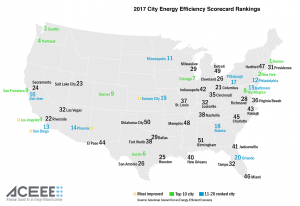
ACEEE ranked energy efficiency in America’s largest cities.
Virginia and its localities demonstrate a commitment to leading energy efficiency and climate change policy. In the wake of President Trump’s decision to withdraw the U.S. from the Paris Climate Agreement, Virginia has declared that it will continue efforts to mitigate climate change.
On June 5th, Governor Terry McAuliffe joined the U.S. Climate Alliance, a group of states in solidarity to uphold the goals of the Paris accord.
“As the first state in the Trump era to take executive action to limit carbon emissions and create clean energy jobs, Virginia is proud to join this alliance of states, cities and businesses. President Trump’s announcement to withdraw the United States from the Paris Climate Agreement does not speak for the states and cities that are committed to fighting climate change and paving the way for a new energy economy. If the federal government insists on abdicating leadership on this issue, it will be up to the American people to step forward — and in Virginia, we are doing just that.” –Gov. McAuliffe
In addition to support at the state level, as of June 3, 2017, more than two hundred mayors of U.S. cities have indicated support for the objectives of the alliance. Among them are VAEEC members Alexandria, Richmond, Charlottesville and Arlington County.

Virginia leaders from both the public and private sectors are joining forces to fight climate change and uphold the Paris accord.
These locations, as well as Virginia businesses, Randolph College and the University of Richmond (another VAEEC member), have signed the “We Are Still In” agreement.
Among the 51 cities ranked in the ACEEE scorecard, Richmond and Virginia Beach ranked 28th and 36th respectively. In addition, Richmond was one of three cities to earn a perfect score for municipal energy efficiency-related goals. The Scorecard and rankings act as a marker for progress and encourages cities to further energy efficiency efforts.
Arlington County and Charlottesville were also listed on the Scorecard website as unranked cities. They used the ACEEE criteria to create a self-score equivalent to the Scorecard’s ratings and were highlighted for their efforts and commitment to energy efficiency.
All four of the Virginia locations listed are VAEEC members. In fact, ACEEE awarded points for VAEEC membership. In their view, as an advocate for higher energy standards, membership with the VAEEC reflects a commitment to improving efficiency.
Here’s the breakdown of each city’s ACEEE score.
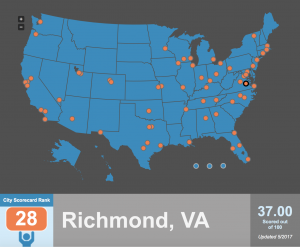 Virginia’s capital scored 37.00 out of 100 possible points. Richmond earned high marks in the local government category, outlining numerous policies for energy goals and strategies to reduce usage. One of the more ambitious goals began in 2014 with the RVAgreen Annual Progress Report. A goal was set to reduce the government greenhouse gas emissions by 80% by 2050 using 2008 as a baseline. Though this is a significant reduction rate, the ACEEE says Richmond is on track to achieving its goal. The report centered its recommendations for improvements in the energy and utility category, as well as transportation.
Virginia’s capital scored 37.00 out of 100 possible points. Richmond earned high marks in the local government category, outlining numerous policies for energy goals and strategies to reduce usage. One of the more ambitious goals began in 2014 with the RVAgreen Annual Progress Report. A goal was set to reduce the government greenhouse gas emissions by 80% by 2050 using 2008 as a baseline. Though this is a significant reduction rate, the ACEEE says Richmond is on track to achieving its goal. The report centered its recommendations for improvements in the energy and utility category, as well as transportation.
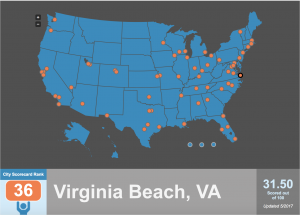 Virginia Beach scored 31.50 out of 100 possible points. Scoring similarly to Richmond, Virginia Beach was recognized for its Sustainability Plan which outlines some of the energy-efficiency related policies for its government operations. Virginia Beach also benchmarks 100% of local government buildings in ENERGY STAR Portfolio Manager. In addition, Virginia Beach has several community-wide initiatives, including the adoption of an urban heat island mitigation goal to achieve 45% urban tree canopy cover citywide by 2023. Like Richmond, Virginia Beach’s opportunities for improvement were in energy and utilities, and transportation.
Virginia Beach scored 31.50 out of 100 possible points. Scoring similarly to Richmond, Virginia Beach was recognized for its Sustainability Plan which outlines some of the energy-efficiency related policies for its government operations. Virginia Beach also benchmarks 100% of local government buildings in ENERGY STAR Portfolio Manager. In addition, Virginia Beach has several community-wide initiatives, including the adoption of an urban heat island mitigation goal to achieve 45% urban tree canopy cover citywide by 2023. Like Richmond, Virginia Beach’s opportunities for improvement were in energy and utilities, and transportation.
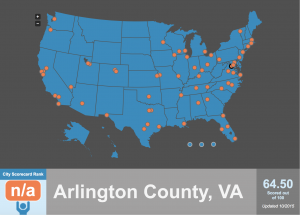 Though Arlington was not officially scored, the self-score generated was 64.50 out of 100 points. This places Arlington on par with some of America’s largest, most energy efficient cities. The county has outlined comprehensive strategies to reduce energy consumption and the Arlington Initiative to Rethink Energy oversees the implementation of these policies. Arlington also scores impressively in both building policies and transportation, with a Master Transportation Plan that aims to promote more pedestrian and bicycle transit. Though scoring high in most categories, room to grow can be found most in energy and utilities.
Though Arlington was not officially scored, the self-score generated was 64.50 out of 100 points. This places Arlington on par with some of America’s largest, most energy efficient cities. The county has outlined comprehensive strategies to reduce energy consumption and the Arlington Initiative to Rethink Energy oversees the implementation of these policies. Arlington also scores impressively in both building policies and transportation, with a Master Transportation Plan that aims to promote more pedestrian and bicycle transit. Though scoring high in most categories, room to grow can be found most in energy and utilities.
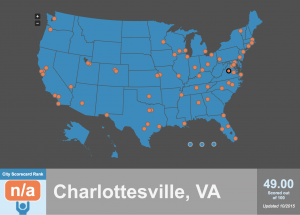 Charlottesville also self-scored and earned 49.00 out of 100 points. Of the Virginia locations scored, Charlottesville earned the most points for energy and utilities with a funded partnership with, another VAEEC member, the Local Energy Alliance Program (LEAP) and rebates for water conservation initiatives. Charlottesville also has green building requirements for municipal buildings and works through LEAP to fund the limited time 0% Power Saving Loan Program as part of its initiatives for efficient buildings. Charlottesville’s community-wide initiatives and local government operations are where improvements can be made most.
Charlottesville also self-scored and earned 49.00 out of 100 points. Of the Virginia locations scored, Charlottesville earned the most points for energy and utilities with a funded partnership with, another VAEEC member, the Local Energy Alliance Program (LEAP) and rebates for water conservation initiatives. Charlottesville also has green building requirements for municipal buildings and works through LEAP to fund the limited time 0% Power Saving Loan Program as part of its initiatives for efficient buildings. Charlottesville’s community-wide initiatives and local government operations are where improvements can be made most.
To see the full breakdown of scores for each city visit the ACEEE’s website.
Don’t see your town on the City Scorecard? Click here to try the updated Local Energy Efficiency Self-Scoring Tool, and see how your community stacks up! The Self-Scoring Tool is based off the 2015 City Scorecard.

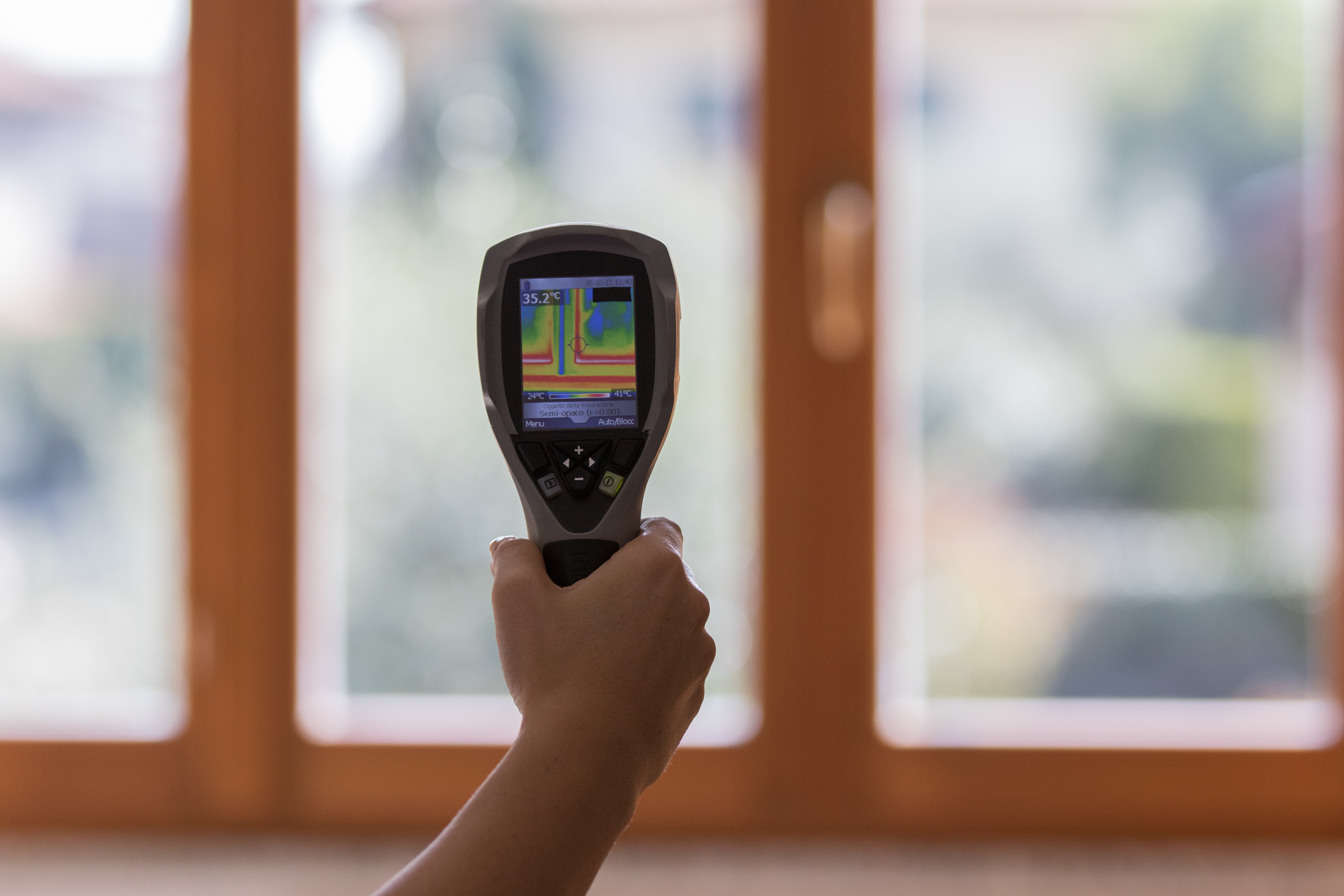
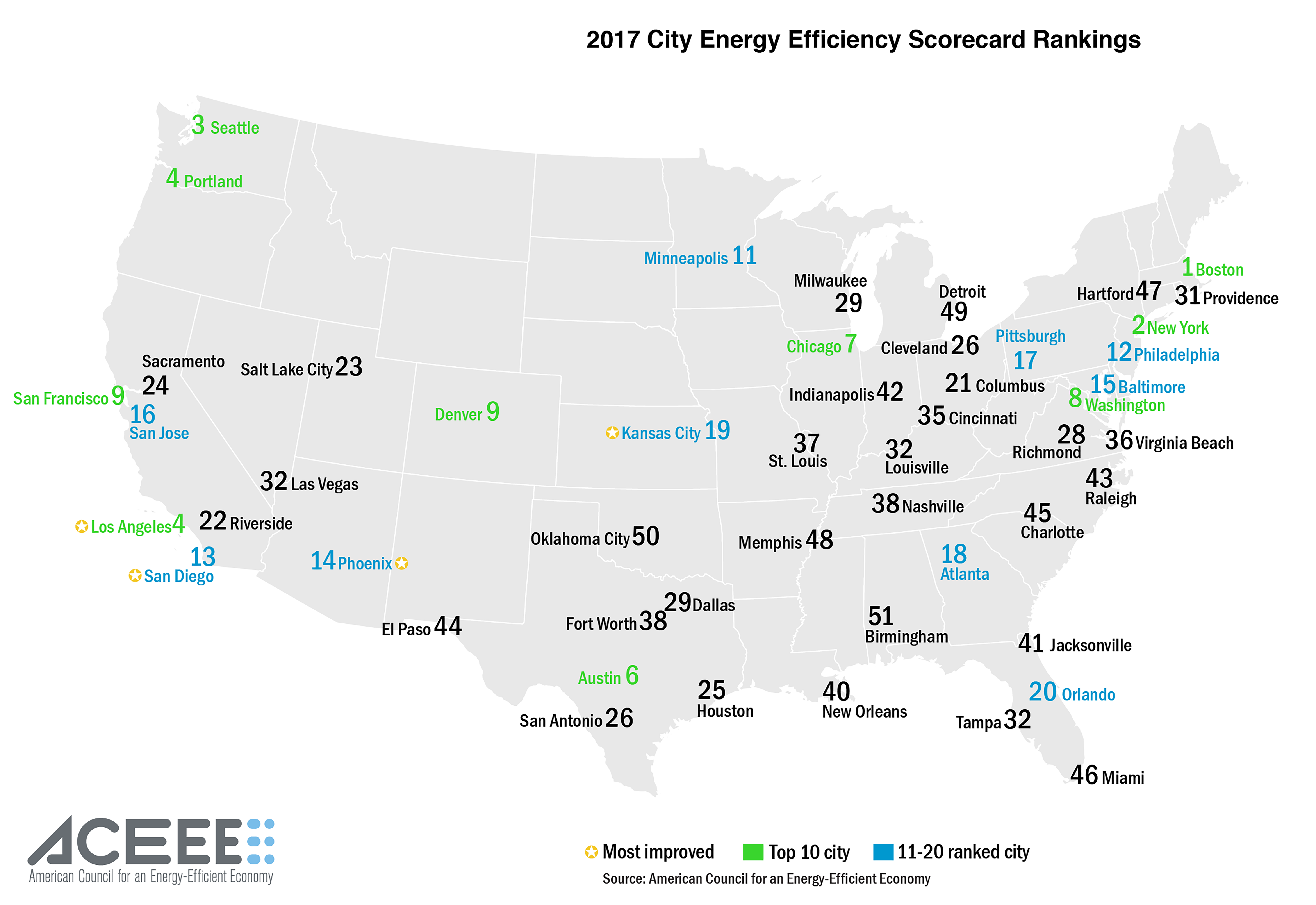




 Charlottesville also self-scored and earned 49.00 out of 100 points. Of the Virginia locations scored, Charlottesville earned the most points for energy and utilities with a funded partnership with, another VAEEC member, the Local Energy Alliance Program (LEAP) and rebates for water conservation initiatives. Charlottesville also has green building requirements for municipal buildings and works through LEAP to fund the limited time 0% Power Saving Loan Program as part of its initiatives for efficient buildings. Charlottesville’s community-wide initiatives and local government operations are where improvements can be made most.
Charlottesville also self-scored and earned 49.00 out of 100 points. Of the Virginia locations scored, Charlottesville earned the most points for energy and utilities with a funded partnership with, another VAEEC member, the Local Energy Alliance Program (LEAP) and rebates for water conservation initiatives. Charlottesville also has green building requirements for municipal buildings and works through LEAP to fund the limited time 0% Power Saving Loan Program as part of its initiatives for efficient buildings. Charlottesville’s community-wide initiatives and local government operations are where improvements can be made most.